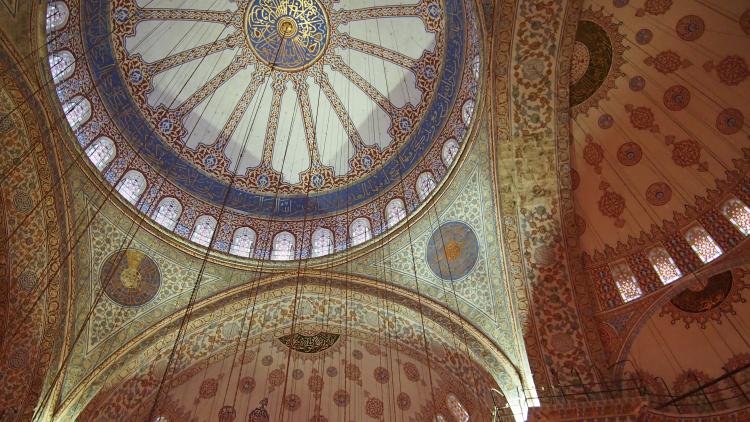BA Arabic and...



Key information
- Duration
- 4 years
- Start of programme
- September 2026
- Attendance mode
- Full-time
- Location
- Campus
- Fees
-
Home: £9,535
International: £23,780 - Entry requirements
-
AAB-ABB
For joint degrees, the offer is based on the subject with the higher entry requirements
Contextual: ABB-BBB
-
See undergraduate entry requirements and English language requirements for international and alternative entry requirements.
Course overview
The BA Arabic and... allows you to combine the study of Arabic with an unparalleled range of disciplines and languages.
Combined honours degrees in Arabic are intended to give students a solid grounding in Modern Standard and Classical Arabic, as well as conversational ability in Colloquial Arabic, in combination with a second subject. Intensive study of a wide range of Arabic language and literature is a compulsory feature of combined-honours degrees in Arabic. Students are required to spend the third year of study at a university or language institute in the Middle East.
Why study BA Arabic and... at SOAS?
- SOAS is ranked 7th in the UK for African and Middle Eastern Studies (Complete University Guide Subject League Table 2026)
- We are ranked 13th in the UK for Modern Languages (QS World University Rankings 2025)
- We are ranked 2nd in the UK for 'graduate prospects' (Complete University Guide Subject League Table 2026)
- Modern Languages and Linguistics at SOAS has been ranked 10th in the UK in the Research Excellence Framework (REF) 2021
- We've also been ranked 4th for research environment - with 100% of our research ranked as 'internationally excellent' and 85% as 'world-leading' - and 8th for research outputs in the REF 2021

Use our combined courses tool to see a breakdown of course structure
Key information set data
Teaching and learning
All full-time undergraduate programmes consist of 120 credits per year, taught in modules of 30 credits (taught over 10 or 20 weeks) or 15 credits (taught over 10 weeks). Students on BA Arabic and … degrees take half their credits in Arabic and Arabic-related modules and half their credits in their other subject. The programme structure shows which modules are compulsory and which are optional.
Contact hours
In the School of Languages, Cultures and Linguistics, undergraduate modules take various forms. Modules may be taught through 1 or 2 hours of lectures a week, and some may have an additional 1-2 hours of weekly seminars. 15-credit language classes may be 4-5 hours per week in the first and second year, typically less at higher levels.
As a rough guide, 1 credit equals approximately 10 hours of work. Most of this will be independent study. It will also include class time, which may include lectures, seminars and other classes. Some subjects, such as learning a language, have more class time than others
Year abroad
Students have the choice to spend the Arabic Language Year Abroad at one of the following institutions:
- Qasid Institute in Amman, Jordan
- French Institute
Year abroad programmes run from September to May of the following year and involve 15-17 hours of instruction per week. While the syllabus differs somewhat from one institution to the other, the prime focus throughout is on enhancing the students’ reading, writing, speaking and listening skills in Modern Standard Arabic as well as on imparting an advanced level of competence in the local form of Colloquial Arabic.
In order to be admitted to the final year of their degree, students will need to have passed the final language examinations at the year abroad institution. Students who fail the language year abroad will not be able to progress to the final year and will repeat the language year abroad.
For general advice on tuition fees, travel arrangements, health and insurance issues see study abroad and exchange.
The SOAS Arabic Section arranges year abroad meetings and briefing sessions where second year students are informed in detail about the year abroad locations and have the chance to meet and consult with returning students.
In determining the safety of year abroad locations SOAS is guided by the relevant Travel Advice published by the Foreign and Commonwealth Office (FCO). During their stay abroad it is recommended that students subscribe to the relevant FCO website.
In order to be admitted to the final year of their degree students will need to have passed the final language examinations at the year abroad institution and to have submitted their ISP by the specified deadline. The ISPs will be marked by the year abroad institution and reviewed by members of the SOAS Arabic Section. The best ISP from each location will be published on the SOAS website.
Students who fail the year abroad examinations or fail to submit their ISPs are deemed to have failed the year abroad. In order to be admitted to the final year of their degree they will need to repeat the language year abroad programme in one of the four designated locations.
For general advice on tuition fees, travel arrangements, health and insurance issues see study abroad and exchange.
The SOAS Arabic Section arranges year abroad meetings and briefing sessions where second year students are informed in detail about the year abroad locations and have the chance to meet and consult with returning students.
In determining the safety of year abroad locations SOAS is guided by the relevant Travel Advice published by the Foreign and Commonwealth Office (FCO). During their stay abroad it is recommended that students subscribe to the relevant FCO website.
SOAS Library
SOAS Library is one of the world's most important academic libraries for the study of Africa, Asia and the Middle East, attracting scholars from all over the world. The Library houses over 1.2 million volumes, together with significant archival holdings, special collections and a growing network of electronic resources.
Fees and funding
Fees for 2025/26 entrants per academic year
| Programme | Full-time | |
|---|---|---|
| UK students | Overseas students | |
| BA, BSc, LLB | £9,535 | £22,870 |
| BA/BSc Language year abroad | £1,385 | £11,770 |
- See undergraduate fees for further details.
Employment
Graduates of the School of Languages, Cultures and Linguistics leave SOAS not only with linguistic and cultural expertise, but also with skills in written and oral communication, analysis and problem solving.
Recent School of Languages, Cultures and Linguistics graduates have been hired by:
- Africa Matters
- Amnesty International
- Arab British Chamber of Commerce
- BBC World Service
- British High Commission
- Council for British Research in the Levant
- Department for International Development
- Edelman
- Embassy of Jordan
- Ernst & Young
- Foreign & Commonwealth Office
- Institute of Arab and Islamic Studies
- Middle East Eye
- Saïd Foundation
- TalkAbout Speech Therapy
- The Black Curriculum
- The Telegraph
- United Nations Development Programme
- UNHCR, the UN Refugee Agency
- Wall Street Journal
Find out about our Careers Service.












